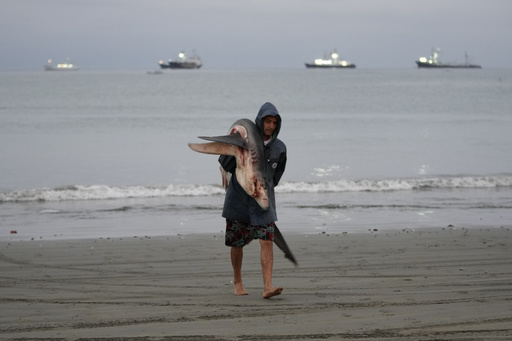
SAN MATEO, Ecuador — Oswaldo Angulo embodies the spirit of his fishing heritage, having learned the craft from his father after leaving high school. At 36, he spends weeks at sea and returns to live with his parents, a lifestyle he cherishes. In contrast, his younger brother Marlon was also deeply connected to the sea but tumbled into the drug trade. The U.S. Coast Guard apprehended him in 2018 with a speedboat loaded with a ton of cocaine, and he is currently serving an 11-year prison sentence. Their middle brother, Anthony, took a different path, pursuing a degree in communications. However, the surge in violence across Ecuador over recent years prompted him to flee with the hope of a safer life in the U.S., leaving San Mateo on December 27, 2023.
The Angulo family’s story highlights the broader migration crisis affecting Ecuador. Gangs have unleashed relentless violence and extortion across the nation, displacing thousands and disrupting entire communities. As a result, Ecuadorians have become the fourth-largest nationality arrested at the U.S. border in the past year, despite their challenges not typically qualifying them for asylum. The perilous journey involves substantial financial costs and the risk of death or kidnapping, with many hoping to enter a U.S. immigration system that is often overwhelmed and takes years to resolve cases.
In Ecuador, growing violence has led to diminishing economic opportunities, higher unemployment, and falling wages. The sense of despair is palpable, with many residents doubting their government’s effectiveness. Anthony’s motivation to leave was fueled by the rising tide of crime, including alarming threats such as extortion and kidnapping that punctuated daily life. The disappearance of six local fishermen just weeks before he left became a turning point, compelling him to act on his safety concerns.
San Mateo, a small fishing village with a population of just 5,000, remains deeply intertwined with fishing culture. The stunning coastal views contrast sharply with the sobering reality of idled boats and struggling fishermen. Many locals still manage to fish for various species, but the increased violence has crushed opportunities for some, leading them to abandon the trade altogether. Despite Ecuador’s rich natural resources and tourist attractions, infrastructure remains poor, from pothole-ridden roads to power outages caused by dried-up energy supplies.
Ecuador, long viewed as a peaceful country, has been rocked by drug trafficking and gang conflicts since around 2018. The current administration, led by President Daniel Noboa, has responded by deploying military forces to combat gang activity, but the challenge remains substantial as powerful cartels continue to exert control over local gangs.
Guayaquil, the country’s largest city and a vital port, has been particularly hard hit, with Manta ranking high in global murder rates. Extortion has become commonplace, forcing businesses of all sizes to pay a “protection fee” known colloquially as “vacunas.” These extortion payments burden all strata of society and contribute to the pervasive atmosphere of fear and economic insecurity.
In San Mateo, fishermen pay for these vacunas, and the toll of crime has driven a sense of urgency among many to leave the country. The painful disappearances of fishermen, including two teens, have left the community reeling, prompting desperate searches when locals went missing. The recovery of three bodies only deepened the trauma but did little to deter the gang-related dangers that plague the fishing community.
As authorities grapple with how to respond to the escalating violence, they openly acknowledge the difficulties residents face. Local leaders like Javier Briones have stressed the inadequacy of resources to combat organized crime effectively. In an environment where losses are frequent and livelihoods are threatened, it is little wonder that many are seeking a way out.
For Oswaldo, working on large ships keeps him somewhat sheltered from violence, but he has noticed an increase in fishermen leaving for the U.S. The options for those making the treacherous journey have changed over the years. Anthony Angulo recently made his way to the U.S. after navigating a complicated path that involved crossing dangerous terrains or relying on smugglers.
Anthony’s journey ultimately led him to the U.S., where he was detained for three months before being released to pursue asylum. Now, he resides in New Jersey, working in a factory while sending financial support back home. His mother finds solace in knowing he is near Marlon, his brother, who is incarcerated but set to be released soon.
As Anthony reflects on his experiences, he acknowledges how easy it can be to take one’s circumstances for granted. He dreams of one day returning to Ecuador but acknowledges the present dangers mean that could be a long way off. “I can’t return to Ecuador until things get better,” he remarked, echoing the sentiments of countless families across the nation desperate for a more secure future.
